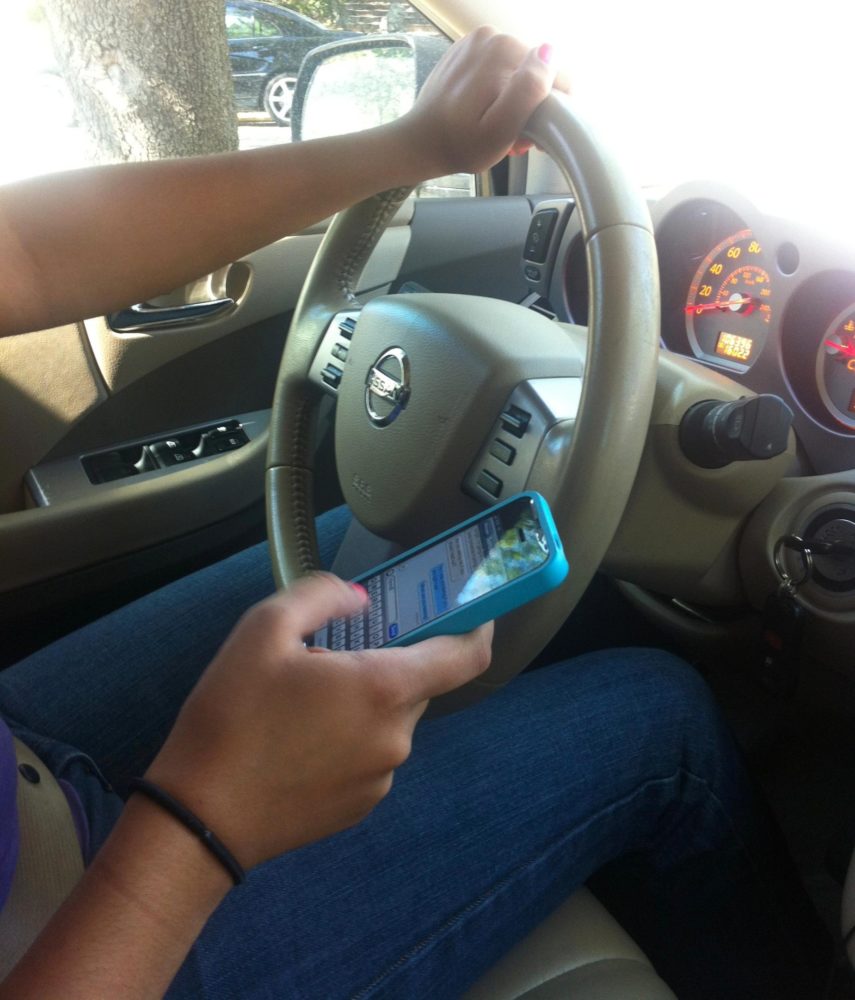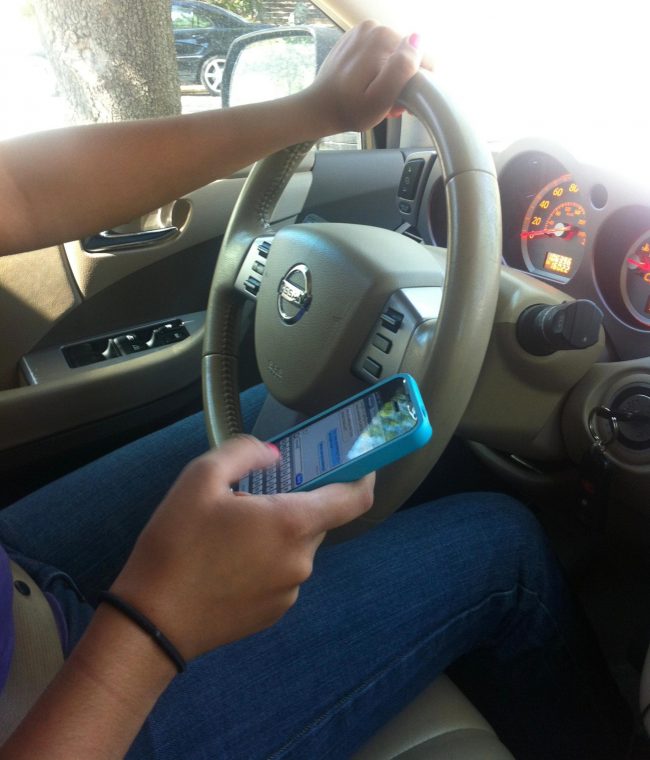
The Texas House of Representatives approved a statewide ban on texting while driving on April 17. If approved by the state Senate and Gov. Rick Perry, Texas will join 39 other states that have outlawed texting while driving. (SMU/Tashika Varma)
SMU freshman Charlie Weber said he watched in horror as his friend snuck in a text while driving down Hillcrest Road in Dallas. Weber, a Kansas native, has been accustomed to a ban on texting while driving, and back home it was rare to see friends or family pull out their phone on the road.
“I know Texas is always the last state to make something illegal, but texting while driving leads to a lot of accidents and doesn’t make any sense when you could pull over to the side to text or just wait five minutes till you reach your destination,” Weber said.
The Texas House of Representatives approved a statewide ban on texting while driving on April 17. After a final vote on April 18, the bill went to the state Senate. The legislation would ban texting, emailing, reading texts or instant messaging while driving. The use of GPS or talking on the phone would still be allowed. If approved by the state Senate and Gov. Rick Perry, Texans will join 39 other states that have outlawed texting while driving.
Texas does have a law prohibiting teenage drivers from cell phone use, but the new bill would apply to people of all ages. If the bill passes, drivers that are caught texting while driving could face a $100 fine and a misdemeanor traffic ticket.
Sgt. Lance Koppa, spokesman for the Highland Park Department of Public Safety, said that the Highland Park Police department would be ready to enforce the ban on texting and driving.
“If this passes and becomes state law and is a new part of our traffic code, we would start with educating the motoring public on the new law,” Koppa said. “Enforcement would be similar to the enforcement already in place in school zones during those times when use of a wireless communication device is prohibited.”
For enforcement in school zones, Highland Park police first make sure that the flashing lights that signal to a driver that he or she is entering a school zone are working, according to Koppa. Since Highland Park police drive Tahoes and the cars sit up higher than most, police officers then keep a look out for drivers looking down with their cell phones in their hands. If they suspect texting, they pull the driver over.
SMU English professor Bruce Levy, an avid bicyclist, knows how dangerous texting while driving is to other drivers. But he is also concerned about the safety for pedestrians and bikers.
“It’s astonishing that we would we even have to think twice about this. It should go without saying that it should be illegal to text while driving,” Levy said. “Driving is serious business and texting distracts.”
In the fall of 2010, an SMU student was driving when she struck another SMU student who was walking to the library. According to The Daily Campus, the student admitted to looking at her cell phone while driving when she heard a crashing sound.
According to the National Highway Traffic Safety Administration (NHTSA), texting while driving is six times more dangerous compared to driving while intoxicated.
The prospect for the bill is still uncertain since Gov. Perry vetoed a similar measure in 2011. According to news reports, Perry said he would wait until the new bill reaches his desk before taking a position.
SMU sophomore Geenah Krisht, who is from Arkansas, where the use of handheld cell phones is completely prohibited, couldn’t believe that Texas allows drivers to text and drive.
“I definitely think texting and driving should be banned in Texas. It’s been banned for a while in my hometown,” Krisht said. “Studies have shown how much texting inhibits your ability to drive.”
According to the website Texting and Driving Safety, 23 percent of automobile accidents involve cell phones. That’s equivalent to 1.3 million crashes a year. A total of 39 states plus Washington D.C. prohibit texting while driving and 10 states prohibit all drivers from using handheld cell phones.
Recent SMU graduate and Texas native Marika Wynne believes that a ban on texting while driving is not the way to make the roads safer. “I think people should have to renew their driving test every five years,” Wynne said. “It’s not that they can’t text and drive, it’s that they can’t drive.”
Weber foresees some negatives to the bill since it won’t apply to GPS use or phone calls.
“Texting is just as bad as using Google maps for directions or checking an email for an address,” he said.
Levy agrees with Weber that this bill will not be enough. The way to make the roads safer is with self-driving cars, Levy said.
“Anything that takes the eyes off the road and causes the hands to fumble around and leave the wheel is inherently dangerous,” he said. “Driverless technology is coming. When it is here, it will be safe for the person behind the wheel to text. But not until then.”










